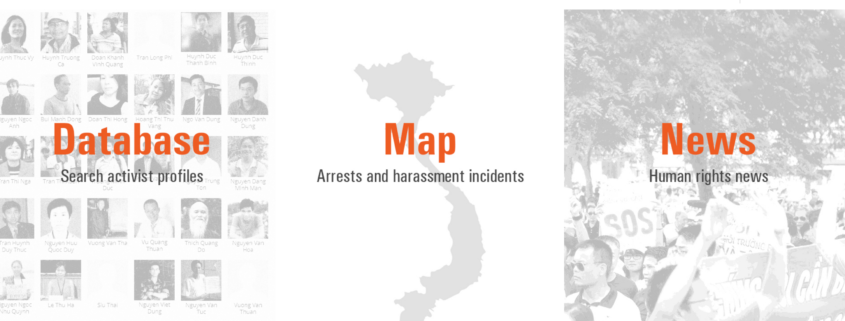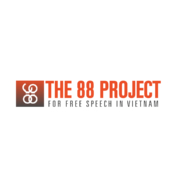The 88 Project Launches New Website Featuring Expanded Database and Map of Human Rights Violations in Vietnam
The 88 Project is pleased to launch the new design of our website https://the88project.org/ on May 3, World Press Freedom Day, 2019. Our previous website was a good way to get started, more than six years ago now. Over the last year, however, thanks to your support, we have grown as an organization. The expanded scope of our work required a new and modern website with a more complex structure and new functionalities that serve our objectives even better and make it easier for users to navigate different parts of the website.
Our new website features new tools and more information on activists at risk and political prisoners in Vietnam. Here’s the line up:
- An expanded Database of Persecuted Activists in Vietnam
- An interactive Map of Human Rights Violations Incidents
- A News portal featuring latest news, analysis, newsletters, and translated materials from the ground. We will report weekly on the news of the week, analyze the situation periodically, and translate writings by activists at risk, political prisoners, and their families. Don’t forget to subscribe to our weekly newsletter to get all the news of the week delivered to your inbox.
- “Their Voices” page featuring video interviews with activists in Vietnam. We have released the first trailer of our interview series with female activists in Vietnam. More are coming soon, so stay tuned.
- A Take Action page compiling advocacy and assistance actions you can take to support the activists and their families.
With these tools, we aim to raise international awareness of the human rights situation in Vietnam, and to serve the information needs of the growing community of international organizations, government officials, and other concerned observers who seek to improve Vietnam’s human rights conditions.
Two major features of the new website are the Database of Persecuted Activists, and the Map of Human Rights Violations. What are these tools, and what do we want to accomplish with them?
Database of Persecuted Activists
The Database of Persecuted Activists is the expanded version of the Vietnamese Political Prisoner Database (formerly at https://vietnamprisoners.info/) that was created as an advocacy tool for the release of political prisoners in Vietnam. The expanded version contains information about activists at risk, in addition to political prisoners.
Besides the expanded scope, the database also includes more details on activists’ profiles and incidents. In addition to searching for individual profiles, users can now search by group incident, i.e. incidents where more than one activist is involved. For example, users can view all the activists who were implicated in the crackdown against June 10, 2018 protesters, or the crackdown against members of Brotherhood for Democracy. When viewing an activist’s profile, users can also see related profiles of activists who were tried in the same trial, or of activists who were implicated in the same incident(s) with the profile they are viewing, if applicable. There is also more information on the activist’s profile: perpetrators of the incident, authorities of arrest, court of first instance, community at risk that the activist belongs to, international organizations that have taken action for the activist, location of the incident or arrest, rights that were violated in an incident/arrest, and supporting documents (photos of the incident, screenshots of sources, court documents, arrest orders, etc.). The May 2019 version of the Database of Persecuted Activists also emphasizes location and tracks the number of incidents that happen in different localities, especially provinces, in a map of human rights violations.
Map of Human Rights Violations
Both the Database and the Map draw from the same pool of data. However, they serve different research purposes. The database is profile-centric: profiles of activists are the focus. The map is centered around events and perpetrators.
The Map of Human Rights Violations highlights human rights violation records by local administrations, specifically provinces, as we believe local governments are playing a more active role in suppressing political dissent. With the expanded database and the mapping function, we are now able to track the human rights violations committed by local authorities. It seems that local authorities have played an increasingly large role in suppressing political dissent in the past decade. However, the trend has not been documented elsewhere. Our map and charts of patterns of human rights violations have proved that provincial authorities are responsible for the vast majority of arrests for “national security” concerns.
The findings from the expanded database might suggest new advocacy directions that aim to hold local governments accountable, in addition to the national government. For instance, the argument linking business and human rights might be more effective at the provincial level than national level if provincial governments are found to be the main perpetrators of human rights violations, since provinces are competing against each other in attracting foreign direct investment. We welcome more suggestions and collaborations to explore this advocacy direction further.
The map features two views that allow users to see the distribution of individual incidents across the country, as well as the distribution of incidents by province, at a quick glance. Users can click on individual markers in the “View by Incident” or on the province in the “View by Province,” to see more details of respective human rights violations. Users can also search and combine different criteria to see the distribution of human rights violation incidents by gender, religion, ethnicity, type of incident, perpetrators, etc., across localities. The map includes events that took place on or after January 1, 2018. Incidents that had occured prior to January 1, 2018 are not tracked with the map, due to difficulty tracking incidents too far back in the past.
It is our sincere hope that the new tools on our new website will raise more awareness about the ongoing human rights violations in Vietnam. We hope to contribute to the advocacy and assistance efforts on behalf of persecuted activists, whose stories and situations are often overlooked or underreported in domestic and international media. Persistence keeps the stories alive. This website is our persistent effort, since 2012, to make sure persecuted activists’ voices are heard and effective actions are taken for positive changes in the political situation in Vietnam. We hope it will serve as an effective infrastructure for all of us to share, receive, and analyze information on human rights in Vietnam. We welcome media inquiries, information requests, collaboration ideas, as well as suggestions to improve our data. Please don’t hesitate to contact us.
© 2019 The 88 Project








